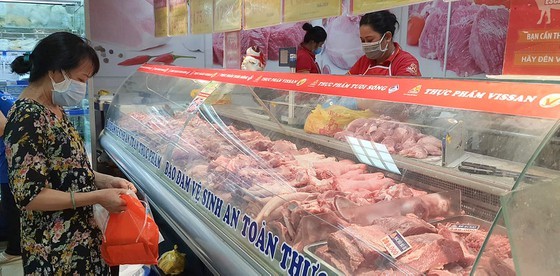
Nguyen Thi Hong Tham, owner of Xuyen A slaughterhouse in Ho Chi Minh City’s Cu Chi District - one of the large private pig slaughterhouses in Ho Chi Minh City, said that before the epidemic, Xuyen A slaughtered about 1,500 pigs per day on average.
When the epidemic broke out, following the direction of the People's Committee of Ho Chi Minh City, the establishment invested over VND100 million in building accommodation and toilets for employees to meet the city’s requirement of Covid-19 prevention task.
However, many employees in the establishment were found to be infected by coronavirus; accordingly, the establishment decided to suspend operations to ensure the safety of workers.
Director To Van Liem Xuan of Thoi Thuong Slaughterhouse in Hoc Mon District said that the factory is still operating with only three out of 13 assembly lines with a capacity of about 1,000 pigs a day. Previously, the factory had called up workers to stay in the slaughterhouse for continued production, but many workers disagreed because of worries about the epidemic.
Vietnam's leading foodstuff processor Vissan detected 43 infection cases of Covid-19, with 357 contacts F1 and 354 contacts F2 from July 17 to 22. Contacts F1 and F2 were isolated at the company’s camp.
The southern metropolis has nine slaughterhouses whereas four establishments were closed due to the coronavirus pandemic. On average, slaughterhouses in Ho Chi Minh City kill about 3,200 pigs per day, down 54.6 percent compared to days before the epidemic.
According to the HCMC Department of Agriculture and Rural Development, the slaughterhouses that have stopped operation due to a Covid-19 spread are urgently developing a plan to reopen in the upcoming time.
However, the slaughterhouse owners expected their workers can receive vaccine jabs as soon as possible because their employees are exposed to the humid slaughtering environment and contact with traders who have brought pigs from provinces and cities.
























